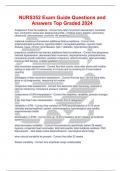NURS352 Exam Guide Questions and
Answers Top Graded 2024
Antepartum Fetal Surveillance - Correct Ans-fetal movement assessment, nonstress
test, contraction stress test, biophsycial profile, umbilical artery doppler velocimetry,
ultrasound, amniocentesis, chorionic villi sampling
maternal conditions that warrant additional fetal surveillance - Correct Ans-
antiphospholipid syndrome, hyperthyroidism, hemoglobinopahties, cyanotic heart
disease, lupus, chronic renal disease, type 1 diabetes, hypertensive disorders,
pregnancy conditions that warrant additional fetal surveillance - Correct Ans-pregnancy
induced hypertension, decreased fetal movement, oligohydramnios, polyhydramnios,
intrauterine growth restriction, postterm pregnancy, isoimmunixation, fetal anomalies,
previous fetal demise, multiple gestation
fetal movement assessment - Correct Ans-kick counts, done after dinner with mother
resting on side with 10 movements in 2 hours and no smoking for 2 hours before
counting
advatages of fetal movement assessment - Correct Ans-low tech, can be done daily,
done on all pregnancies, reassuring for mother
intrapartum fetal assessment - Correct Ans-electronic fetal monioring- external or
internal monitoring, intrauterine pressure catheter
components of EFM interpretation - Correct Ans-baseline, variability, periodic changes
3 tier fetal heart rate interpreteation - Correct Ans-3 categories
variability in EFM - Correct Ans-variation of FHR around baseline of 5-10 which
indivates parasympathetic system, chemoreceptors, baroreceptors and cardiac
responsiveness health
acceleration in EFM - Correct Ans-up 10-25 of baseline which indiates sympathetic
system
what decreases variability - Correct Ans-prematurity-specifically before 28 weeks,
hypoxia, congenital heart anomalies, fetal tachycardia, fetal metabolic acidosis, CNS
depressants, , fetal sleep cycles,betamethasone, neurological abnormality
when should variability be present - Correct Ans-after 32 weeks
Absent variability - Correct Ans-amplitude range undetectable
,minimal variability - Correct Ans-<5 bpm
moderate variability - Correct Ans-6-25 bpm
Marked variability - Correct Ans->25 bpm
most significant sign of fetal compromise - Correct Ans-Variability in FHR that is
persistently absent or minimal
normal range hr fetal - Correct Ans-120-160
fetal bradcardia - Correct Ans-less than 120
causes of bradycardia in fetus - Correct Ans-heart block, occiput posterior, transverse
position, serious fetal compromise
tachycardia in fetus - Correct Ans-over 160
mild tachycardia in fetus - Correct Ans-160-180
severe tachycardia in fetus - Correct Ans-over 180
tachycardia over 200 bpm in fetus - Correct Ans-usually due to congenital anomaies or
fetal tachyarrhythmia
persisent tachycardia w fetal hypoxia, fetal anemia, maternal fever suggests - Correct
Ans-chorioamnionitis
category 1 - Correct Ans-Baseline 110-160, variability is moderate, accelerates present
or absent, early decelerations present or absent, and variable or late decelerations
absent
what does category 1 mean - Correct Ans-Not a risk to a fetus - normal acid-base status
at time, routine care
category 2 - Correct Ans-tachy or brady cardia w/o absent variability, minimial
variability, absent variability w/o recurrent decelerations, marked variability, absence of
accelerations after stim, recurrent variable decelerations with miniminal or mod
varaibility, prolonged decelation from 2-10 min, reccurent late decelerations w mod
variability, variable decelerations w slow return to baseline or overshoot
what does category 2 mean - Correct Ans-indeterminate, not predictive of abnormal
fetal acid base status but requires continued monitoring
, category 3 - Correct Ans-sinusoidal pattern or absent variabiilty w recurrent late
decelerations, recurrent variable decelerations, or bradycardia
what does category 3 mean - Correct Ans-abnormal fetal acid base status, efforts to
expedite can resolve underlying cause
deceleration classifications - Correct Ans-early, variable, late, prolonged
early deceleration - Correct Ans-FHR decrease before contraction, mirror image of
contraction and EHR
late deceleration - Correct Ans-The slowing of the fetal heart rate after the onset of a
uterine contraction and persisting after the contraction ends.
VEAL CHOP - Correct Ans-V- Variable C- Cord Comphression
E- Early Decels H- Head Compression
A- Accelerations O - OK
L-Late Decels P - Placenta insuff
types of reduced placental exchange - Correct Ans-excessive contractions,
hypotension, maternal hypoxemia, hypertension, diabetes IUGR, abruption
IUGR - Correct Ans-intrauterine growth restriction
late deceleration picture - Correct Ans-
early deceleration picture - Correct Ans-
variable deceleration picture - Correct Ans-
variable deceleration - Correct Ans-Periodic change in fetal heart rate caused by
umbilical cord compression; decelerations vary in onset, occurrence, and waveform.
usually V or W shaped
severe variable deceleration with overshoot - Correct Ans-variability preserved and
shows good reserve
fetal distress nursing interventions - Correct Ans-reposition patient, turn off pitocin,
increase IV rate, admin O2, assess labor and scalp stimulation, assess for cord
prolapse, notify provider, prepare for labor and resus
non stress test - Correct Ans-electronic monitoring w/o contractions
what happens to heart rate when fetus moves - Correct Ans-accelerates




